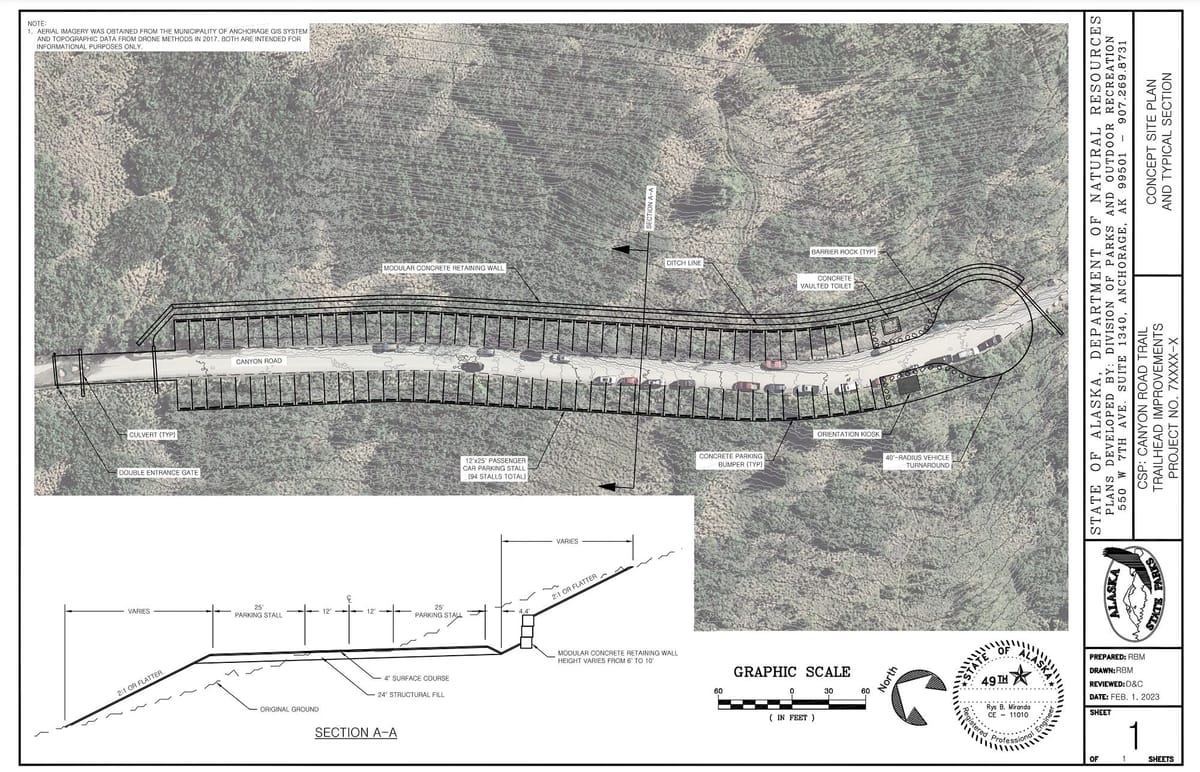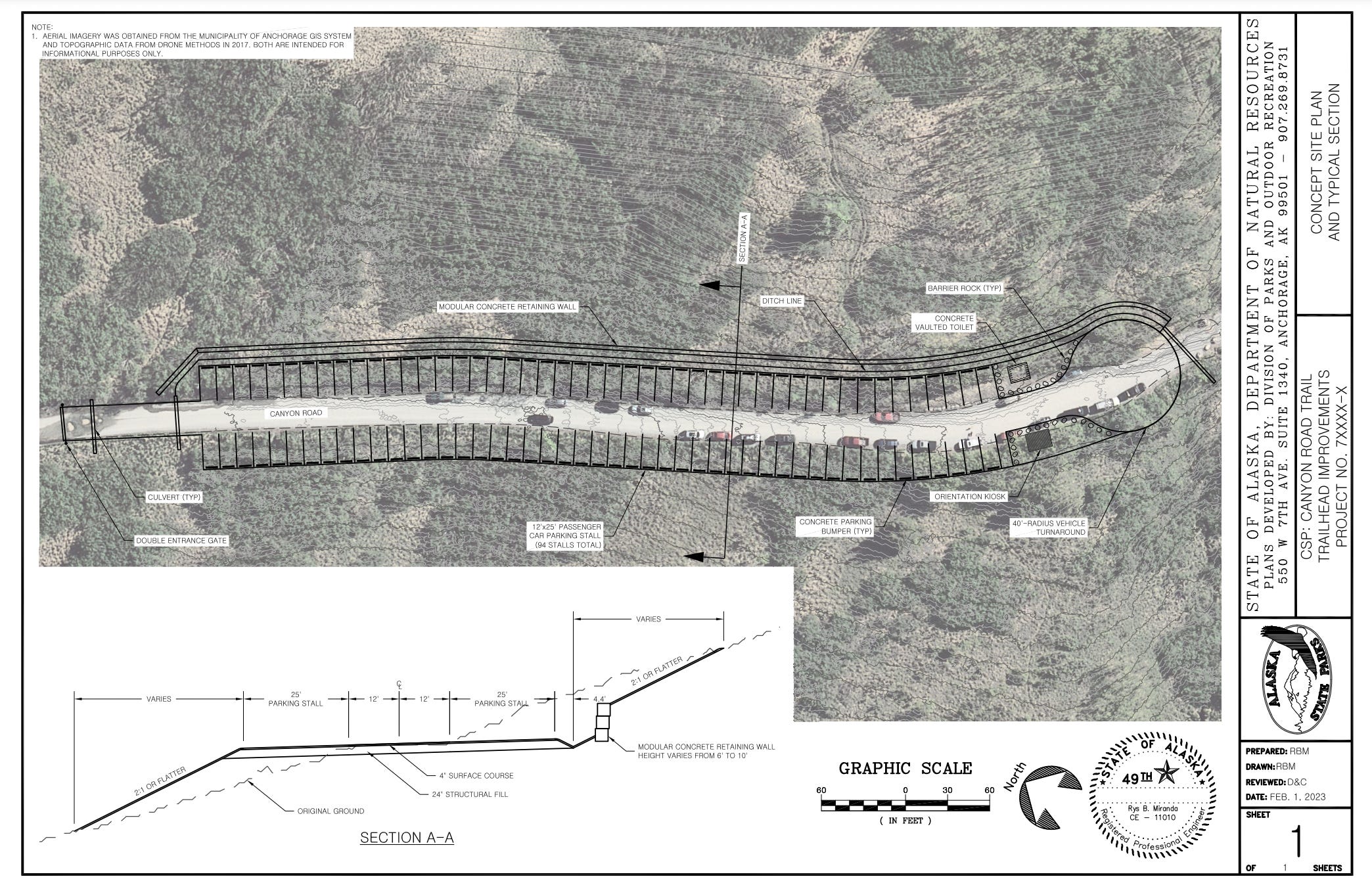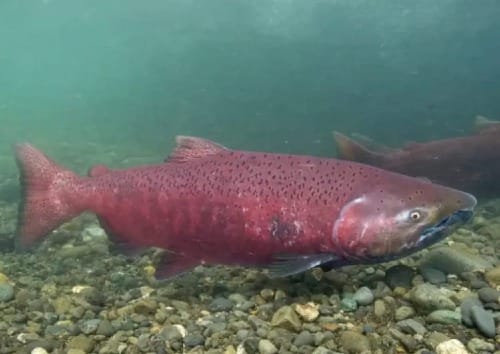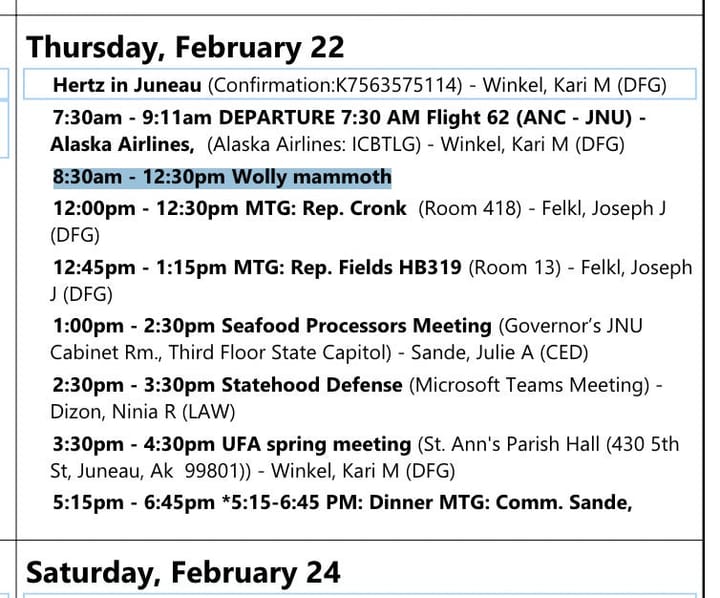Interesting stuff: A major Anchorage trailhead upgrade, a legislative trip to North Dakota and Begich-hosted mayoral forums
Plus, Alaska's state-owned economic development agency could invest in a new North Slope infrastructure project.

This edition of Northern Journal is sponsored by The Boardroom, a shared workspace in Anchorage. The Boardroom’s array of comfy and light-filled workspaces are a great change of pace from my home office; there’s good coffee and free kombucha, plus regular events like tacos and happy hours. Check out membership options here.
Northern Journal is a reader-supported publication. To receive new posts and support my work, consider becoming a free or paid subscriber.
State parks division begins multimillion-dollar upgrade to Anchorage trailhead near Flattop
Alaska state parks managers are starting a planning process that could ultimately bring dozens of new parking spaces to the overcrowded Anchorage trailhead that many hikers, bikers and skiers use to access Flattop Mountain, Peak 3 and Rabbit Lake.
The Division of Parks and Outdoor Recreation recently released a request for proposals for preliminary engineering work at the popular Canyon Road trailhead, where users currently contend with a narrow dirt road and limited parking.
The agency’s plans could change based on the results of the engineering work, spokeswoman Wendy Sailors said by email. But documents posted with the request include a preliminary design concept with 94 parking spaces, which would represent a major expansion.

“A proper parking lot at this location has been on our list for a very long time. It was just a matter of timing, funding and resources to make it happen,” Sailors said.
Federal money from the Land and Water Conservation Fund, along with state matching cash, will help pay for what parks officials describe as a multi-year project. The total budget is $1.9 million.
Begich skips mayoral endorsement for now, will host forums instead
Mark Begich, the Democratic former U.S. senator, has declined to endorse a candidate in the opening months of Anchorage’s 2024 mayoral race — opting instead to host a series of forums that leading candidates can use to present their platforms and raise money from Begich’s well-connected network.
Begich has invited each of the leading candidates, including Republican incumbent Dave Bronson, to appear with him at separate forums next month. An endorsement, if he makes one, would not come until afterward, he said in an interview with Northern Journal.
The forums will be on Zoom; similar programs he hosted during last year’s congressional race drew a “couple hundred” guests, Begich said.
“I’m fair to everyone, the way I moderate it,” he said. “This forum is designed to be informative on the issues people care about: snow removal, homelessness, crime, infrastructure — nuts and bolts municipal stuff.”
Begich, who served as Anchorage mayor for six years, has long been a power broker in state and municipal politics.
His decision not to favor any of the leading candidates in April’s city election reflects his evolution into a pragmatic, deal-making businessman who maintains working relationships with both incumbent and aspiring politicians across the ideological spectrum. Last week, he hosted Bronson at his company holiday party.
Begich has worked with the city Assembly and Bronson’s administration to advance a major hotel redevelopment project that he co-owns on the eastern edge of downtown. The city has paid one of his businesses to provide hotel rooms for people experiencing homelessness, and another Begich business manages a low-income and supportive housing center for people just emerging from homelessness.
Last month, a Canadian mining company developing a project in Interior Alaska also named Begich to its board.
Former state gas line boss resurfaces pitching green fuels
Keith Meyer, the Texan who formerly headed Alaska’s state-owned natural gas pipeline corporation, is now pitching a new project: using wind power to produce sustainable, hydrogen-based fuels for export.
Meyer, who made headlines for his $550,000 base salary during former Gov. Bill Walker’s administration, is now working as an advisor to HIF Global.
The company, according to its website, aims to produce carbon-neutral replacements for fossil fuels using renewable energy, and it’s already testing its technology at a pilot plant in Chile that runs on wind power.
Meyer says the company is scouting Alaska for the same reason it's in Chile: The northern and southern regions of the globe have strong winds.
"Alaska, I think, has enormous potential," Meyer said in a brief interview.
The company is still in the early days of its work in Alaska, but if a project is built in the state, it could represent an investment of $1 billion or more, Meyer added. Products could be sold locally, including to airlines at Anchorage's airport — which is one of the world's biggest cargo hubs — but the primary customer base is in Asia, he said.
"It's a way to export the wind," Meyer said.
Meyer had a dinner meeting in October with HIF executives and Republican Gov. Mike Dunleavy, along with an Alaska-based lobbyist hired by the company, Ashley Reed, according to copies of Dunleavy’s calendar obtained by Northern Journal through a public records request.
AIDEA approves another repayment delay for Bluecrest, plus study of new North Slope plant
Alaska’s state-owned economic development agency has approved a new payment delay for an oil and gas company that borrowed $30 million to buy a drilling rig for a project in Cook Inlet, the offshore basin outside Anchorage.
Bluecrest Energy has already negotiated multiple extensions to its repayment plan in the past several years. It indicated that it could not make a $135,000 payment due at the end of December to the Alaska Industrial Development and Export Authority, Geoff Johns, the authority’s chief investment officer, told board members at a meeting last week.
The company asked for a year of “forbearance,” but AIDEA’s staff recommended that the board approve a shorter window of three months. The board, in a unanimous vote, passed a resolution approving a forbearance agreement that allows the agency's executive director, Randy Ruaro, to negotiate the final details.
Bluecrest has drawn increasing attention amid an impending shortage of available natural gas in Cook Inlet, which Anchorage and other urban areas of Alaska use for home heating and electricity generation. The company’s executives say Bluecrest is sitting on a large deposit of gas, but hasn’t been able to raise money from investors to drill because of market-related uncertainty.
The company still plans to pay off its full AIDEA loan, said Benjy Johnson, Bluecrest’s chief executive.
“Our objective is to make sure that AIDEA is fully taken care of in this deal,” he said in a brief interview.
At the same meeting, AIDEA's board also approved a feasibility study and financing plan that could lead to the agency's investment in a significant new infrastructure project in Alaska's oil patch.
A company called Alyeschem is developing a $116 million plant on the North Slope that would convert natural gas into two products that oil companies currently have to import there: methanol and low-sulfur diesel.
Alyeschem is currently finalizing contracts with two of the North Slope’s biggest oil and gas producers, Hilcorp and ConocoPhillips.
Methanol is used for freeze protection in the area’s punishing cold climate, while diesel made on the North Slope from crude oil has too much sulfur to be burned in engines there, according to documents shared with AIDEA by Alyeschem.
The project would cut carbon emissions by 45,000 tons each year and reduce traffic on the Dalton Highway between the North Slope and the rest of Alaska's road system, according to the documents.
AIDEA’s budget of up to $150,000 for its investment analysis would be reimbursed by Alyeschem, according to the documents approved by AIDEA’s board.
AIDEA could ultimately invest some $55 million in the project, the documents said. Other investors in Alyeschem include Anchorage-based finance firm McKinley Capital and a private equity firm.
Legislators, commissioners head to North Dakota for carbon meetings
A delegation of nine Alaska legislators along with several high-ranking Dunleavy administration officials recently traveled to North Dakota to learn about the state’s efforts to promote the capture and storage of carbon pollution.
Five senators, four representatives Natural Resources Commissioner John Boyle and Alaska Oil and Gas Conservation Commission Chair Brett Huber were among those who made the trip. The visit included tours of an active carbon capture and injection site and another one under development, according to Lorraine Henry, a spokeswoman for the Alaska Department of Natural Resources.
Henry said her agency paid for the expenses of the five natural resources department employees who attended. Lawmakers paid for their trips out of the Legislature’s budget, said Republican Sen. Click Bishop of Fairbanks, who participated.
The University of North Dakota’s Energy and Environmental Research Center hosted the summit, Henry said in a written statement. It included North Dakota natural resource and energy officials, lawmakers and industry members involved in what’s known as “carbon capture, utilization and storage,” or CCUS.
Republican Gov. Mike Dunleavy signed legislation earlier this year that establishes a framework for such projects in Alaska.
Some oil industry-aligned policymakers, like Dunleavy, support CCUS as a way to allow for continuing extraction and use of fossil fuels while mitigating their climate-warming emissions.
“I want to do everything I can to keep our coal plants going, and if CCUS is part of the mix, more power to them,” Bishop said.
But skeptics caution that CCUS technology is expensive and hasn’t yet been proven on a large scale.
Legislators on the North Dakota trip included Bishop, Republican Sens. Cathy Giessel of Anchorage and Bert Stedman of Sitka; Democratic Sens. Bill Wielechowski of Anchorage and Donny Olson of Golovin; independent Rep. Bryce Edgmon of Dillingham; and Republican Reps. George Rauscher of Sutton, Julie Coulombe of Anchorage and Frank Tomaszewski of Fairbanks.
Some of those same lawmakers also participated in a recent trip with utility executives and researchers to Iceland, where they learned about how the isolated country produces and distributes its electricity and energy.
Dunleavy meets with non-Alaska lawmakers on busy East Coast trip
Dunleavy held an unusual series of meetings with non-Alaska lawmakers on a lengthy visit to the East Coast in October, according to his public calendar.
Dunleavy also went to Indianapolis for events with the Republican Governors Association and stopped twice in New York City for meetings with finance firms.
In Washington D.C., he met with Republican U.S. Sen. John Boozman of Arkansas, Democratic U.S. Sen. Joe Manchin of West Virginia, Republican U.S. Sen. John Barrasso of Wyoming, Republican U.S. Sen. Shelley Moore Capito of West Virginia, Republican U.S. Sen. Mike Lee of Utah and an array of U.S. representatives, including Ryan Zinke, a Republican from Montana who served as U.S. interior secretary under former President Donald Trump.
Dunleavy also held a meeting with Yousef Al Otaiba, the ambassador to the U.S. from the United Arab Emirates — a major oil and gas producing nation.
Asked about the subject of the meetings with lawmakers and Otaiba, a Dunleavy spokesman, Jeff Turner, said he had no information about them. Instead, he shared a statement about a separate meeting that the governor held with top U.S. Senate aides.
“The governor used the opportunity to educate them about Alaska’s history, how our state constitution requires the development of its natural resources so state government can pay for essential services, and to clear up misconceptions about our state,” Turner said.
Want to advertise in Northern Journal? My new ad policy is here.



